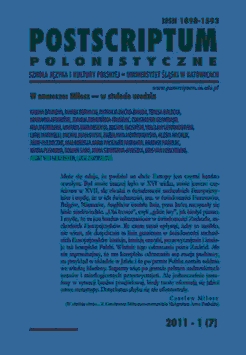Wobec nicości. Miłosz – dysydent
Confronting Nothingness. Miłosz – Dissident
Author(s): Michał MasłowskiSubject(s): Language and Literature Studies
Published by: Wydawnictwo Uniwersytetu Śląskiego
Keywords: Czeław Miłosz; biography; ideology
Summary/Abstract: Worldwide known poet, Czesław Miłosz, was he a dissident? The idea of „dissidency‟ usually excludes appreciation. Yet Miłosz, being always in opposition to dominant tendencies, was always acknowledged. The article presents three periods of his life: in Vilnius, in Paris and in America. In catholic and conservative Vilnius he represented a “left-wing” orientation. Afterwords when he worked in Polish radio, it caused his transfer to Warsaw. His leftist beliefs explain his work in diplomacy for a new regime. This continued till 1950 when Miłosz, terrified with Stalinism, chose asylum in Paris. He was being fiercely attacked both by conservative emigration and leftist French intellectuals. He was accepted, however, by Parisian Kultura circle – the most creative centre of political reflection. In The Captive Mind – soon acknowledged as the most important book in this matter – Miłosz masterfully diagnoses “a new faith”. In 1960 Miłosz became a professor in the Department of Slavic Languages and Literatures in Berkeley. It was there that important works analyzing nihilistic crisis of Western civilization and consumerism connected with Americanization were written: The Land of Ulro (1977), Emperor of the Earth (1977) and especially A View of San Francisco Bay (1988). His reflections concentrate also on ontological crisis and working on new religious imagination. Czesław Miłosz was never a politician or oppositionist in a traditional sense of these terms. Nevertheless, he kept searching for the essence and roots of ideology, the style of life and faith, regarding the fundamental values he fiercely criticized Communism, Americanization and the usurpation of faith by Polish nationalism. He was appreciated, but protests against his burial at Skałka confirm how sharp and influential his observations were.
Journal: Postscriptum Polonistyczne
- Issue Year: 7/2011
- Issue No: 1
- Page Range: 29-46
- Page Count: 18
- Language: Polish

